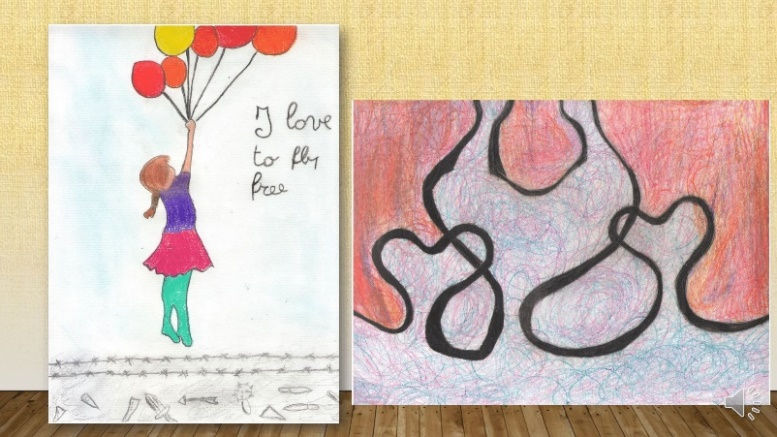
 |  |  |  |  |
|---|---|---|---|---|
 |  |  |  |
Experimentation
The voices of the teachers
During the academic year 2020-2021, teachers of schools involved in the experimental group were trained and supported in carrying out PROMEHS curriculum with their students. They faced many difficulties because of the COVID-19 pandemic, including quarantines and lockdowns. However, they did their best to promote students’ mental health and prevent problematic behaviors at school. The PROMEHS trainers guided them in the promotion of their own and students’ social and emotional learning and resilience and the prevention of problematic behaviors at school. Here below you can find some reflections by teachers who attended the PROMEHS training
“The themes developed (during the training) were relevant, and the proposed activities were very interesting. With it, I could think about myself, allowing me to stop and think about me, my emotions, and my attitudes towards others. It’s been a long time since I have done this analysis, and it was so important. I stopped to think about myself, as a person but also as a teacher. These moments are rare and yet so important. We enter into our routine that we end up not having time to think about ourselves and the way we relate to others, and in this training, that was possible. In the practical part of this training (PROMEHS implementation), I and my students lived very interesting moments, of sharing and complicity that allow us to get to know each other better since the developed activities are based on stories that are part of our reality. The students could see themselves in the stories that were read, which was the starting point for a long conversation, full of surprises, experiences, and emotions. I identified very well with the sessions that I proposed to develop, which was also important for their success.” (Portuguese teacher]
“I thought it would be much work, and by looking at the teachers’ manual, it seemed hard to implement. With the implementation of the sessions and a closer look, everything became clearer and simpler. I selected the activities I thought were best for my class, and the “path” started with this organization. The fact that I am a primary school teacher was an advantage because I could manage time. I was able to deepen the themes while working on the different curricular subjects with no time pressure since I was with the students for five hours a day. I could develop and implement the activities at the necessary time. The training was an important help […]. The training and the supervision allowed me to increase knowledge and share ideas and experiences with colleagues from different schools across the country. There were moments of reflection on the reality of each group that was very enriching.”. (Portuguese teacher)
“This training gave me many tools and information to enrich myself, leading me to linger and reflect on my general way to face the routine. It helped me to reflect on both my emotional wellbeing and the importance of social-emotional learning at school, to let children develop important competences that will help them grow up healthy and consciously. […] Now I pay more attention to students’ feelings, I try to understand what is the reason why they feel them.”. (Italian teacher)
“This training gave me many tools and information to enrich myself, leading me to linger and reflect on my general way to face the routine. It helped me to reflect on both my emotional wellbeing and the importance of social-emotional learning at school, to let children develop important competences that will help them grow up healthy and consciously. […] Now I pay more attention to students’ feelings, I try to understand what is the reason why they feel them.”. (Italian teacher)
“It is (was) a 10th grade, half of the students did not know each other because they came from different schools. During the first period, two big groups were created (the ones that belong already in school and the others), and problems started to exist between them, like making fun of, jokes, mockery, and online threats. Some parents and students reported me these situations. During the PROMEHS sessions, this situation ended, the students got to know each other better, and the unpleasant situations ended. Today, not all are friends, but they tolerate each other.” (Portuguese teacher).
“I embraced this project with confidence and the activities in the classroom confirmed my expectations: a classroom climate of wellbeing guarantees more effective and meaningful learning. The students (high secondary school) need to talk about themselves and these activities allow to create the opportunity to bring out problems of the class group, discuss and reflect on them. Someone might argue that it is a waste of time at the expense of teaching, but it is exactly the opposite! Dedicating a weekly space, an hour, to important topics such as recognizing and managing emotions, resilience, positive thinking, etc., leads to a greater awareness of ones’ abilities and limits and better deal with situations, including those related to the learning. To conclude, I strongly believe in promoting mental health at school and I will keep on doing it.”(Italian teacher)
Gallery
The teachers involved in the experimentation implemented the PROMEHS curriculum in their classrooms.
The PROMEHS handbooks were valuable resources to talk about topics perceived as relevant for students (e.g., identifying and managing emotions, solving conflicts with peers, understanding and respecting rules, etc.).
To achieve the greatest benefit, teachers embedded the activities of the handbooks into the school curriculum within their subject areas. Here below you can see some photos of activities and teachers' comments.
























